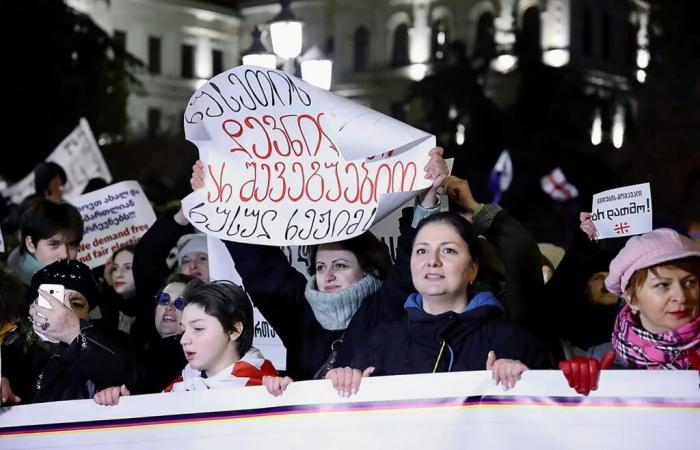The Georgian political scientist analyzes the resistance movement which is growing in Georgia in response to the rigged legislative elections, the election of a new illegitimate president and, above all, the government decision to suspend the EU accession process. Georgia is at a crossroads, and no one can predict what might happen there next.
“We are experiencing an unusual Russian winter in Georgia, but we will have a Georgian spring!!! » Georgian President of French origin Salomé Zourabichvili wrote on X (formerly Twitter) late in the evening of December 15.
For 18 days, tens, hundreds of thousands of Georgians have braved water cannons, tear gas, police brutality and extrajudicial arrests to defend their republic against a Quisling regime [NDLR: du nom du chef du gouvernement norvégien pendant l’occupation allemande, qui est devenu le modèle du gouvernement de collaboration avec un occupant] which hardens quickly.
If you think this is exaggerated, scroll down the Georgian government's account on X and you will read this: “It is common knowledge that Estonia and Lithuania are states whose sovereignty is currently the most limited in the EU, and whose governments act on the instructions of the administration of a foreign country, and not in the interest of their own people. »
President Salomé Zourabichvili said the word résistance very early, in November, to describe what was happening on the streets of Georgia. This word did not resonate immediately: it does not have the same connotation in Georgian as in French, nor the same echo in the political consciousness of the country. But in the mouth of the granddaughter of Georgian political émigrés who fled the Russian occupation, a civil servant born and raised in France, the word “Resistance” is written with a capital letter. Today, this word is heard more and more often on the streets of Georgia.
After the lightning invasion and occupation by the Nazis in 1940, France succumbed to the Vichy regime — a collaborationist government based on conservative and family values, tinged with anti-Semitic xenophobia. But, almost immediately, a resistance movement emerged against the occupying Reich and national collaboration. This resistance was heterogeneous, bringing together Catholic patriots, communists and anarchists, all united by the idea of defending their homeland and its political identity against the invader.
The second Georgian republic collapsed in a different way, by internal subversion, to paraphrase a famous saying: slowly, then very quickly. The Georgian Dream came to power in democratic elections in 2012, as a heterogeneous coalition put together by the country's richest man, Bidzina Ivanishvili, with vaguely conservative but rather pro-European leanings. In the years that followed, this coalition slowly got rid of its most pro-European members and gradually took over state institutions. From 2020 and, above all, since Russia's invasion of Ukraine, Bidzina Ivanishvili has led the already conquered country towards an authoritarianism with particularly bitter Russian accents.
Campaigning for the 2024 legislative elections, Mr. Ivanishvili asked voters for a constitutional majority to ban and judge the opposition, severely restrict the rights of the homosexual community, strangle civil society organizations and free media. The Georgian Dream did not get what it wanted and stole the October 26 elections. Then, the opposition having been slow to mobilize its supporters, Ivanishvili delivered the final blow: on November 28, his government announced the decision to interrupt the process of accession to the European Union.
What happened on the streets of Georgia after this announcement, and what continues despite the freezing temperatures, resembles in many ways the French resistance, uniting disparate social and political groups in a final determination to save the republic and, with it, the country's European future.
Resistance creates its own dynamic, dictates its own language and cadence to the visibly clumsy ruling party and the political class in general — opposition political parties have essentially responded to the demands of the streets rather than the direct.
Initially, young people took a special place in efforts to counter the Georgian Dream in its attempts to change the way of life by introducing laws that restricted freedom of association and media, and stigmatized entire groups such as CSO activists or homosexual people as undesirable. In the spring of 2023, these young people came out of nowhere to challenge the police and ridicule their efforts to clear the streets of protesters.
This time, police violence has reached new heights. Of the 400 people arrested during the largely peaceful protests, more than 80% were brutalized, according to the country's rights activist. But their resistance, with fireworks, gas masks, makeshift shields and teams tasked with putting out tear gas canisters, became commonplace and attracted international media attention. As street resistance intensified, exhausted riot police withdrew and masked thugs began chasing protesters through the streets. They knocked on demonstrators' doors and threatened them with phone calls.
In the meantime, resistance has grown and structured: hundreds of civil servants have signed petitions against the country's constitutional change in direction regarding EU integration. Every day, different professional groups come together to parade: from actors to mountain climbers, from computer scientists to cooks. Even supporters of FC Barcelona and Real Madrid put aside their enmity and marched together, unfurling a banner that summed up the attitude towards the Georgian Dream: “We hate each other, but we hate you even more!” »
The demonstrators thumb their noses at the government, which they describe as illegitimate, but the rump Parliament, which only includes deputies from the Georgian Dream (the opposition refuses to sit there because of the falsified electoral results), endorses repressive laws. It is now illegal to cover your face during protests, the sale of gas masks has been banned; If you are caught at a rally, the police can now arrest you again without much evidence. Fines for graffiti, blocking the entrance to an official building, etc. have been multiplied by ten and can land you in prison for 15 days. Other legal changes abolished an independent and professional civil service.
However, the resistance movement now commands the respect and solidarity of more Georgians. According to a recent poll, more than two thirds of them believe that the elections were rigged, and support the demonstrations. Journalists from the newspaper The World visited provincial towns that last demonstrated in 1989.
Georgian Dream propaganda has spent years spewing a message that it is people “without a homeland and without dignity” who are against it. Ironically, they seem to have had their revenge: they are now faced with people who are ready to sacrifice themselves for their homeland and their dignity.
The logic of resistance is the logic of the final battle. Every day that the ruling party hardens its position and refuses to negotiate and restart the normal political process by holding new elections, the spirit of resistance grows, and even its demonstrations are suppressed by force.
In 2023, protesters strongly discouraged young people from confronting the police and reprimanded them for a few incidents. In 2024, more cautious behaviors and symbolic acts have dominated the protest scene. But the treatment of resistance is rarely nuanced, and the bruised faces and broken bones of peaceful citizens who have been subjected to police brutality prevent us from perceiving the police as a “constitutional force of order”. A party which has trampled on the Constitution can no longer legitimately claim to defend it. Groups of youths carrying fireworks and wearing hoods attacked riot police and pushed back the thugs in plain clothes. Tags such as ACAB (“ All Cops Are Bastards “) and 1312 (the numbers corresponding to this acronym) are scrawled on the walls.
Signs of camaraderie and solidarity also flourished. As protests move from night to day, pro-democracy Georgians marching can see people waving hands and flags in solidarity from nearby buildings. The propaganda machine is no longer able to convince the people that only a small group of treacherous renegades opposes the ruling party.
It is true that even many Georgians who say they prefer democracy and consider themselves Europeans have values that are not fully consistent with the European conception of human rights, regarding the treatment of minorities or the protection of employment in the welfare state.
But the conviction that the Georgian nation is intrinsically different from that of Russia, the hatred of Russian imperialism and its methods, and the spontaneous resistance to those who want to establish tyranny at home seem to be much deeper. They transcend social classes, ideological preferences and age groups, and fuel resistance.
Who can predict the future now? Disappointment may very well take over, and today's resisters may return to their gig economy jobs and classrooms. Or the resistance movement could be a sign of deepening civic solidarity and lead to a complete reshaping of Georgia's political scene.
The French example teaches us that forces that resist together can find themselves in bitter conflict once the battle is won. But it also teaches us that solidarity on the battlefield of resistance can help to forge a consensus around the principles of the new republic.
But here we are talking about an unpredictable future. Before that, the battle must be won, and the Georgians are counting on the sympathy and support of the Europeans.
Jaba Devdariani is co-founder (in 2001) and editor-in-chief of Civil.ge, Georgia's news and analysis magazine. He worked as an international civil servant in Bosnia and Herzegovina and Serbia from 2003 to 2011 and consults with governments and international institutions on risk management and conflict resolution. He is a graduate of the Fletcher School of Law and Diplomacy.







